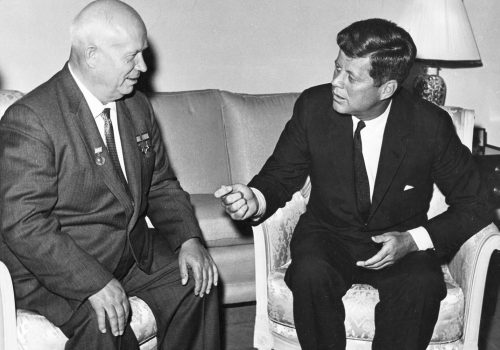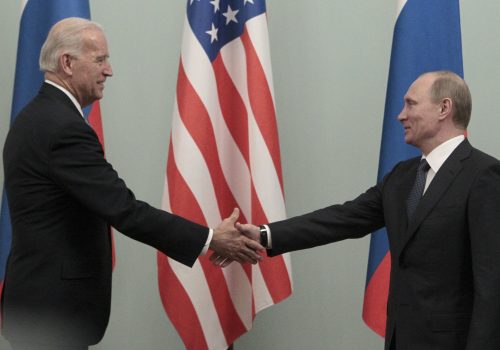June 16, 2021
FAST THINKING: The Biden-Putin staredown
JUST IN
The body language said it all. US President Joe Biden and Russian President Vladimir Putin met in Geneva today for a tense two-and-a-half hours of talks—far shorter than anticipated—on everything from the Arctic and Ukraine to cyberattacks and human rights. Did Biden or Putin come away with any wins? Can US-Russian relations ever be “stable and predictable,” as Biden desires? We called in our crack Russia experts to separate the signals from the noise.
TODAY’S EXPERT REACTION COURTESY OF
- Alexander “Sandy” Vershbow (@ARVershbow): Distinguished fellow and former US ambassador to Russia
- Maria Snegovaya (@MSnegovaya): Nonresident fellow at the Eurasia Center and Russia scholar
- John Herbst (@JohnEdHerbst): Director of the Eurasia Center and former US ambassador to Ukraine
Don’t bet on a reset
- Sandy says the meetings—a bilateral chat followed by a larger group discussion—“took place in a positive, businesslike atmosphere. There were no breakthroughs, but no fireworks.” They also yielded some concrete improvements in Russo-US relations: The leaders’ ambassadors will return to Washington and Moscow after being recalled, and nuclear arms-control talks will advance with a new “Strategic Stability Dialogue.”
- Maria says reducing the talks from three sessions to two was “not a good sign” and the “mutual suspicion” between the two leaders was evident, suggesting that “existing tensions between Russia and the US will continue.”
- But there may have been a logic to the length. Sandy points out that “keeping the meeting short may have been meant to show that the US is not ready to normalize relations or create the appearance of business as usual at this first meeting.”
- Holding the summit at all was “something of a concession to the Kremlin,” John notes. Plus, it came after Biden did not retaliate against Russia-linked cyberattacks and waived sanctions on the company behind the Nord Stream 2 gas pipeline from Russia to Germany, a move John calls “an ill-advised concession to Berlin, but also a gift to Russia.” Russia’s neighbors were wondering whether the Nord Stream decision was “an indicator of new American willingness to accommodate rogue Kremlin behavior,” John says. “But these fears are misplaced, and Biden’s performance in Geneva should give them reassurance.”
Subscribe to Fast Thinking email alerts
Sign up to receive rapid insight in your inbox from Atlantic Council experts on global events as they unfold.

Cyber cipher
- With the United States still recovering from a series of destructive ransomware attacks, which have been directly or indirectly blamed on Russia, cybersecurity was atop the agenda. Biden, in what John calls “precisely the message he needed to convey,” presented Putin with a list of sixteen entities defined as critical infrastructure and tried to get them declared off-limits to cyberattacks.
- “Putin agreed to an experts’ dialogue on cybersecurity, but his denials of responsibility for the recent ransomware attacks leave doubts that Russia will be forthcoming in those talks,” Sandy notes. “Indeed, Biden was at pains to emphasize that the jury was still out on whether Putin would change his behavior in response to his proposals.”
What Putin gets
- Aside from Biden’s gifts of a new pair of custom aviator sunglasses and a crystal statue of a bison, Putin comes away with a burnished reputation from holding a summit with the leader of the world’s most powerful nation, Maria says. Putin’s message to the Russian public will be “that Biden needed to meet him to discuss world affairs,” she predicts. “The Kremlin always underlines that the meeting was initiated by the US side.”
- Judging by his hour-long news conference in which he jousted with the global press, “Putin seemed pleased to have shared the stage with the US president after three years in the wilderness” since his summit with Donald Trump in Helsinki, Sandy says.
What Biden gets
- The US president walks away with “a successful week of summitry,” in Sandy’s view, following the G7, NATO, and EU-US gatherings.
- As a capper to the trip, the Putin meeting showed US leadership in defending democratic values, Sandy argues. Biden “effectively challenged Vladimir Putin to pursue a more constructive agenda for relations based on mutual interest rather than his present disruptive, zero-sum approach.”
- If in the coming months there are no more Russian provocations in Ukraine or in cyberspace, and if imprisoned dissident Alexei Navalny’s condition does not deteriorate—or if Biden “makes good on his public pledge by striking back hard” against fresh Russian “antics”—that will add up to US success at the summit, John says: “While Putin has a slight advantage coming out of Geneva, the real game is coming up.”
Further reading
Tue, Jun 15, 2021
FAST THINKING: What to expect from the Biden-Putin summit
Fast Thinking By
On this episode of Fast Thinking, Atlantic Council experts Doug Klain and Melinda Haring discuss who has the most to gain from the summit and whether this meeting has any chance of stabilizing US-Russia relations.
Sun, Jun 13, 2021
History’s warning for the Biden-Putin meeting
Inflection Points By Frederick Kempe
The dangers rest in the Biden administration’s understandable focus on China as the contest of our times and insufficient realization of the increased challenges Russia poses.
Tue, Jun 1, 2021
Biden-Putin summit: Ukraine should not expect miracles
UkraineAlert By
Ukraine is set to be high on the agenda when US President Joe Biden meets Russia's Vladimir Putin on June 16. However, few expect any breakthroughs towards ending the seven-year Russo-Ukrainian War.
Image: Russian President Vladimir Putin and US President Joe Biden shake hands during a meeting at Villa La Grange in Geneva, Switzerland on June 16, 2021. Photo by Sputnik/Mikhail Metzel via REUTERS.

